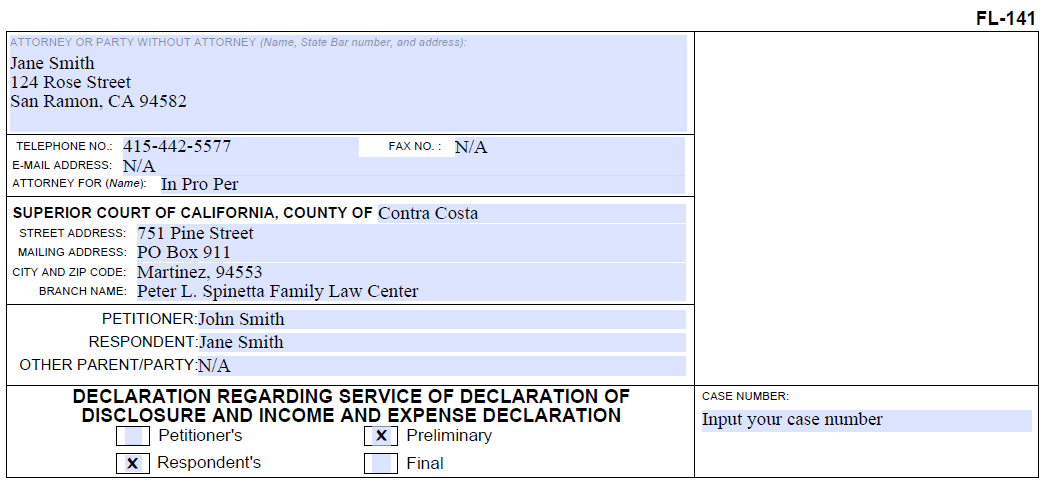Respondent with Children
California Divorce Form FL-141
FL-141: Declaring that you served FL-140, 142, and 150 on your spouse
At this point, you should have already completed forms FL-140, FL-142, and FL-150. This form acts to culminate those 3, and it has an extremely long title. It’s called the “Declaration Regarding Service of Declaration of Disclosure and Income and Expense Declaration.” In this article, we’re completing the preliminary declaration. Preliminary refers to the first time you’re completing this document, and the number one question we receive is,
“Do I have to complete this form?”
The answer is, “yes.”
“But what if…?”
The answer is, “It doesn’t matter.”
“We don’t own anything. Do I have to fill it out?”
“Yes.”
“But we have a full agreement. Do we have to do it?”
“Yes.”
“I don’t want my spouse to know what I have. Do I still have to do it?”
“Yes.”
The bottom line is that all of these forms must be completed, including the Declaration of Disclosure, in order to get a divorce. The good news is if you are actually at this step in the process, it means you’ve done all the work. With this form, you’re stating under penalty of perjury that you have served your Declaration of Disclosure (form FL-140), your Income and Expense Declaration (FL-150), and your other financial disclosures.

FL-141: Personal and Court Information
At this point in the process, it’s likely that you’re an expert on completing the top section on each form referencing court and contact information. Continuing on with our sample respondent Jane Smith, her info is entered as seen above. Don’t forget to enter your case number.
Check the box, “Respondent’s,” followed by the box, “Preliminary.”
1: The Individual Declaring

FL-141: 1 – The Individual Declaring, 2 – Details of Service
2: Details of Service
You’re declaring that the following was served on the other party:
- Preliminary Declaration of Disclosure (FL-140)
- Current Income and Expense Declaration (FL-150)
- Schedule of Assets and Debts (FL-142)
- The past 2 years of tax returns
FL-160 is optional. This tutorial series covers FL-142 because it’s the most common and the option we recommend.
If your spouse is representing themselves and do not have an attorney, you’re going to serve it on the other party. Check the corresponding box. Our sample case has both sides self-represented, so we’re going to select that box as well. If your spouse is represented by an attorney, you want to check the box, “the other party’s attorney.”
If you’re like most, you’ll serve by mail and you’ll use your standard Proof of Service by Mail (FL-335), or, you can serve it personally. Regardless, you’ll need to state which method was used. Don’t forget the date field. Remember, this is a mandatory document in order to get a divorce – if you miss inputting the date, your entire divorce judgement will be denied.
Since this is the Preliminary Declaration of Disclosure, we do not need to fill out the rest of the form. We’ll skip down to the bottom section.
3: Date, Printed Name, and Signature

FL-141: Date, Printed Name, and Signature
You are going to type or print your name, and input the date above. This document, unlike FL-140 and 142, is filed with the court. A brief review of the forms and what you do with each:
- FL-140: Only served on your spouse.
- FL-141 (this form): Filed with the court AND served on your spouse.
- FL-142: Only served on your spouse.
- FL-150: Filed with the court AND served on your spouse.
Remember, this document is mandatory in order to complete your divorce and with the completion of this form, you’ve completed all of your financial disclosures. This concludes our video series on how to begin your divorce, and if you have any questions, please feel free to give us a call at 925-215-1388. You can also send an email.
Best of luck to you in your California divorce!
DIY Divorce Video Series
You're on the Respondent with Children specialized track. Change your course or learn more about all of the court forms involved in a California divorce at our DIY Divorce Center. (scroll to dismiss this notice)
